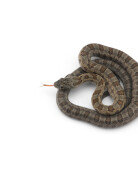The Year of the Golden Pig
The Year of the Golden Pig
Posted January. 02, 2019 07:28,
Updated January. 02, 2019 07:28
As much as pigs were the epitome of good omen in Asia, the year of the pig was relatively peaceful during the turbulent course history.
The year 1899 went unblemished when the destiny of the Joseon Dynasty was perilous. There was an inflow of modern culture such as the opening of Korea’s first railway, the Gyeongin Line, which connected the Jemulpo of Incheon and Noryangjin as well as a long-distance call between Seoul and Incheon. The Independence Newspaper, however, was discontinued in four years since its establishment for publishing an article that criticized Korean Empire. Large-scaled wars steered by the year of the golden pig. The year 1599 was rather peaceful after six year of wars inflicted by Japan’s invasions of Korea in 1592 and 1597.
This does not mean that there was no event. 1893 was the year when persecution against Catholic was extreme. The whole country was disturbed due to persecution in the year of the pig, when 119 Catholics including three Western priests were executed or imprisoned. This was an event incurred by the Cho family of Pungyang who desired to acquire power from the Kims of Andong, who were the family with power and tolerant towards Catholic. The power of the government moved to the Chos of Pungyang after that event.
The year 1659 is famous for the "etiquette controversy." After King Hyojong of Joseon passed away, the government was in conflict over how many years Queen Cho, stepmother of the diseased king, should wear mourning clothes. The argument of the Seoin members who claimed that Queen Cho should wear her mourning clothes for one year by considering that King Hyojong became the king as King Injo’s second son and the argument of the Namin members who claimed that it is necessary for the queen to wear the mourning clothes for three years as King Hyojong was recognized as a legitimate child as he succeeded the lineage of the first-born son even though he was not the first-born son were in a fierce standoff.
1419 was the year when Joseon invaded another country and started a war for the first and last time during the 500 years of Joseon Dynasty. While Joseon was suffering from sporadic loots of Japan, Gen. Lee Jong-moo led the military in attacking Daema Island with 227 fleets and some 17,000 naval forces. He anchored the vessels in the front sea of Daema Island, engaged in war for two weeks and went back home after gaining the submission of the official of Daema Island Sadamori.
The year when the protagonist of old Korean folk song "Cheoyongga," Cheoyong, appeared in the Silla Dynasty was 879, also the year of the pig. Friedrich Hayek, magnate of liberalistic economy, Earnest Hemmingway, an American writer, and Alfred Hitchcock, a movie director, were born in 1899. It was also the year the Spain soccer club FC Barcelona and Italy’s AC Milan was established.
Kyu-Jin Shin newjin@donga.com







